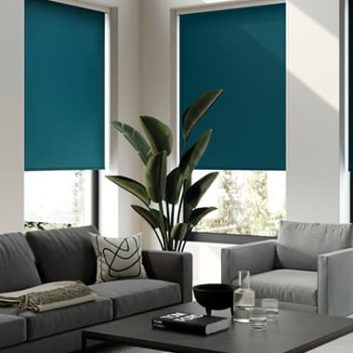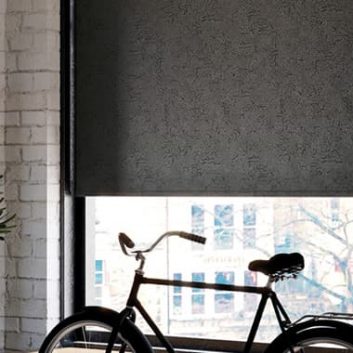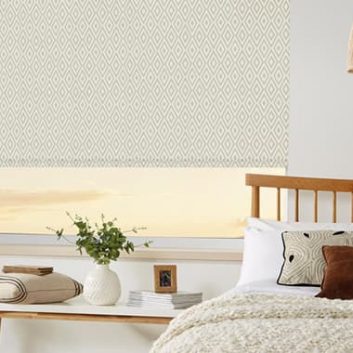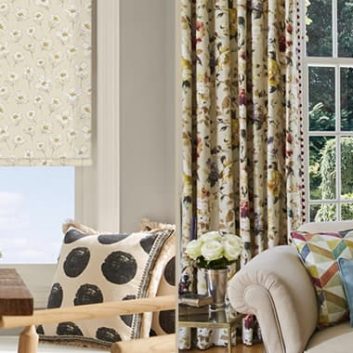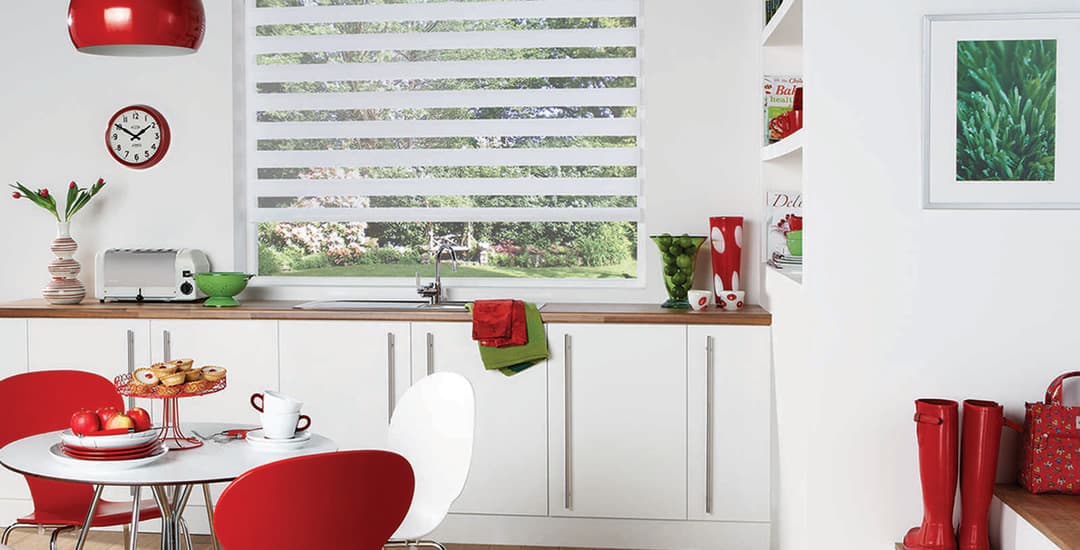
For many if not most kitchens, no. Vision blinds or day and night blinds aren’t waterproof and are somewhat delicate, two traits that we very much do not associate with good blinds for kitchens.
Day and night blinds or vision blinds also fall towards the higher end of the window blind price spectrum, and so it can be an expensive gamble if you shell out for several blinds only to find out in short order that the kitchen is not an environment in which they will thrive.
This blog post will tell you more about vision blinds for kitchens (or day and night blinds, depending on your preferred term) and cover various scenarios in which they may or may not be a good pick.
Are vision/day and night blinds suitable for kitchens as a rule?
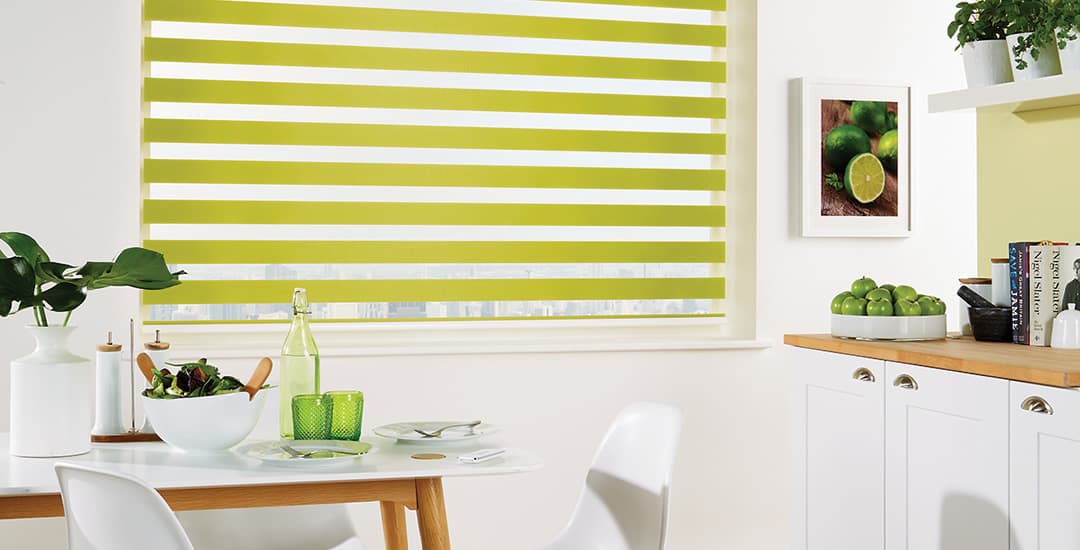
No. If I was forced to give a binary answer, I would caution against choosing day and night blinds or vision blinds for kitchens as a general rule. Day and night blinds/vision blinds aren’t waterproof, and whilst this may not be a dealbreaker for some kitchens, vision blinds or day and night blinds are the blinds I would vote “most likely to wilt faster than your grow-at-home potted basil” when exposed to humidity, heat, or water; even compared to other types of non-waterproof or borderline suitable kitchen blinds.
Now, whilst the blanket rule for kitchen blinds if you want to play it safe is always choose waterproof ones, many people do indeed buy non-waterproof blinds of various different types for their kitchens to no ill effect, depending on their own kitchen (in terms of its size, layout, and ventilation) and how they use it/what and how they cook in it.
Even so, the blinds in question tend to be hardy polyester ones like roller blinds that can cope with a little humidity or the occasional splash, and that are at the bottom end of the price scale too in case things don’t end up going to plan.
I caution against kitchen day and night blinds if you’re at all uncertain about their suitability for your own kitchen, because they’re not only not waterproof, but also treated with a special starching agent to ensure that their fine, sheer stripes hold their shape and hang correctly.
So day and night blinds can potentially suffer from the general impact of contact with water or humidity, and even lose their shape and the correct drape due to this as well, which isn’t the case for most other non-waterproof fabric blinds.
The fine, sheer mesh areas of the blind are delicate as well, and so they cannot be wiped or cleaned effectively of things like spills or cooking splashes and smells without risking damage. And finally, because day and night blinds or vision blinds are made of a porous fabric, they will absorb atmospheric cooking smells over time and again, you can’t remove these but only attempt to mask them, to limited effect.
Are vision/day and night blinds suitable for kitchens that are humid?
No. For all of the reasons I have mentioned above, I strongly discourage using day and night blinds or vision blinds in kitchens that get very humid or condensated. Even if the blinds never get splashed, they will absorb moisture from the air. This will damage the fabric over time, affect the way the blind hangs and falls, potentially warp the sheer parts, and possibly even serve as a good home for mildew to grow on.
Are vision/day and night blinds suitable for kitchens with windows close to the sink or counters?
No again. If there’s a reasonable chance of the blind getting splashed with water or food semi-regularly, this will cause a number of problems. It’s not possible to clean a day and night blind or vision blind with water/cleaning solutions without risking damage, and the water/food or other substance that gets onto it in the first place will potentially stain or damage it too.
Are vision/day and night blinds suitable for kitchens that are well ventilated and airy?
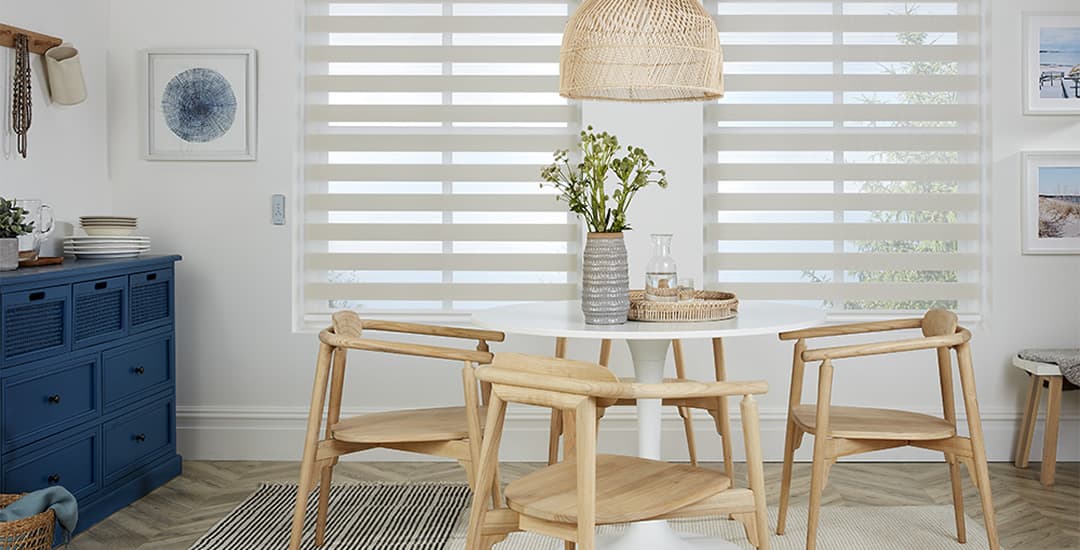
Yes. If you have a kitchen that simply doesn’t get very humid or condensated (either because it’s large, airy, well ventilated, or all three, or because you don’t make the sort of food and drinks that generate steam) day and night blinds or vision blinds will be ok, as long as they’re also not likely to get splashed.
Factor in not just water-based humidity here, but also vapourised cooking fats in the air, which will cause the blind to develop a greasy/dirty film over time and also to smell of chip fat or whatever it is too.
Do vision/day and night blinds pick up cooking smells in the kitchen over time?
Yes. Whatever you cook, if it generates aroma (good or bad!) your blind will absorb these smells sooner or later. And somehow, it always seems to end up being chip fat, vindaloo, haddock, cabbage, and other smells that most of us tend to think of as better tasted than inhaled; never nice things like cake or coffee or freshly baked bread!
Can you wash or clean vision/day and night blinds in kitchens?
No. day and night blinds or vision blinds can’t be washed off or otherwise treated/exposed to water, cleaning solutions and so on in any meaningful way.
You can’t deep-clean day and night blinds or vision blinds with water/cleaning fluids, and so if you do cook and generate cooking smells, the blind will pick these up and churn them back out into the room at some point. If the blind does start to smell of cooking, you’re very limited in what you can do about this. You can’t even really use Febreeze or other forms of odour neutraliser or masking scents on the blind directly, as spraying them with liquids will again affect the starch coating of the blind as well as the fabric itself.

